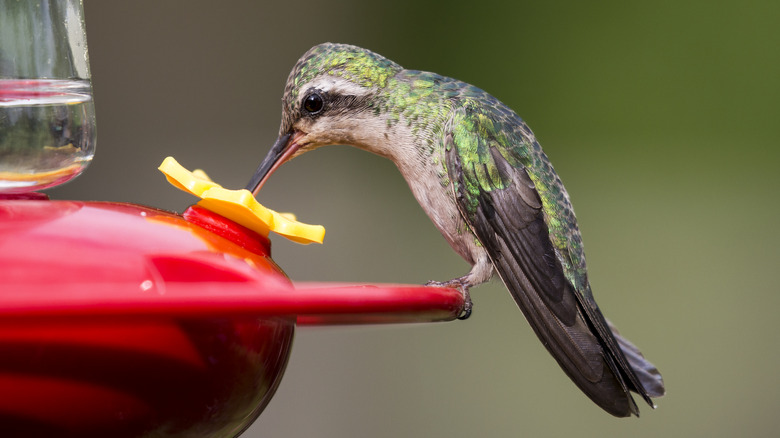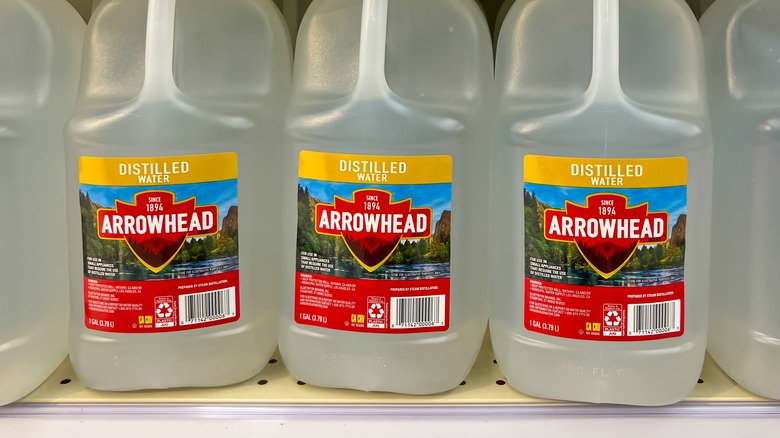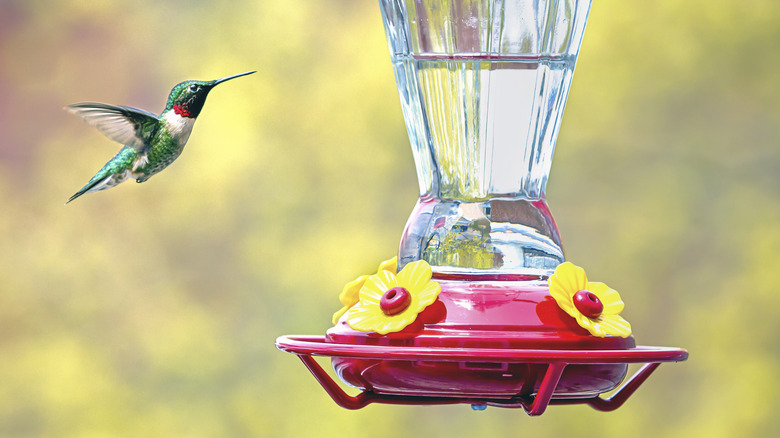Why Using Distilled Water In DIY Hummingbird Nectar Is A Bad Idea
Whether you appreciate them for their beauty, pest control, or another reason, hummingbirds can bring many benefits to your yard. To keep these amazing creatures interested in returning to your property, water features are important, like a refreshing mister or a bath. You also want to provide sources of water and nectar, which you can mix yourself. If you're like most households, you probably have multiple sources of water to choose from for these animals, and you may be wondering: Is it safe to use distilled water to feed hummingbirds?
Although distilled water isn't toxic, it's also not the best choice for creating hummingbird nectar (1 part sugar and 4 parts water). It goes through a process where it's converted to steam and back to a liquid to remove 99.9% of its natural minerals. Although removing them is a desirable option for certain uses, hummingbirds need a variety of nutrients to remain healthy.
Hummingbirds use insects as their main source of minerals, vitamins, and other important nutrients. But nectar can provide trace materials for these birds, too. Many nectar recipes recommend avoiding distilled water because of its lack of available minerals. Most instead call for using simple tap water (avoid water softeners, though) or even bottled spring water because they still contain enough nourishment.
How do I know if I'm using distilled water?
With so many sources of water available, should you worry about using the wrong source to create your hummingbird nectar? And how do you know if you are using distilled aqua or a source that removes the minerals in a similar manner? If it's coming out of your tap or going through a home filter, it's not distilled. Most grocery stores, hardware stores, and general retailers carry distilled water, and the label will clearly mark it as such. You'll often see it in 1-gallon jugs, which usually cost around $10 per unit.
Although distilled is a type of purified water, they are not the same. Purified water goes through additional steps to remove impurities, including reverse osmosis and ion exchange, which make it safer for drinking than distilled-only water. Reverse osmosis systems remove potentially dangerous contaminants, such as lead, bacteria, volatile organic compounds (VOCs), and more. Meanwhile, ion exchange is a process that removes ionic contaminants, similar to water softening.
You might purchase and use distilled water regularly if you have things in your home like humidifiers, continuous positive airway pressure (CPAP) machines, and nasal irrigation devices. Some people also use it in fish aquariums or when watering plants. The primary reason to use distilled is to avoid a scale or mineral buildup on your appliances in the home.
Why some people might consider using it for their feeder
If you are using a water softener at home to remove iron, calcium, magnesium, and more minerals, you should not use the softened water to create your hummingbird nectar recipe. During the softening process, the device adds salt to the aqua, negating the minerals. Even though it doesn't taste salty if you drink it, the procedure adds about 28 milligrams of sodium to every 8 ounces of water. You don't want to add any sodium chloride to the nectar because it could negatively affect the health of your hummingbirds.
For this reason, people with softener appliances in their homes may consider using distilled water to create nectar because they can be sure that all the sodium chloride is filtered out. But think again: Actual flower syrup contains trace amounts of natural salts, so you don't want to get rid of them completely. Ultimately, tap water is the safest bet for creating nectar at home. You don't need to boil the tap water for hummingbirds, either — hot is just fine. If you have a softener and you don't have a separate tap for drinking that bypasses the softener or a filter that removes the salt, you may want to use bottled spring water. These are far better options than using distilled water — there's just no good reason to use it for making hummingbird nectar.


